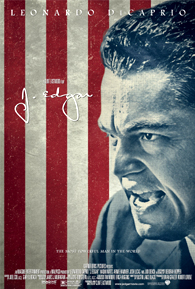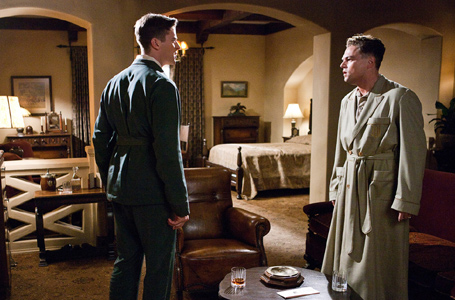
What are we to make out of this? Are we supposed to be relieved at the passing of a paranoid, vindictive, small-minded, and self-aggrandising megalomaniac? Or are we supposed to look upon this character, warts and all, with pity, and accept his gargantuan achievements and black marks? This strange collaboration between Clint Eastwood (by no means a liberal) and Dustin Lance Black (a LGBT activist) poses these questions to us and offers no easy answers.
The film begins like a straightforward biopic. An aged J Edgar Hoover, at the pinnacle of his career and the completion of his life's work, narrates to a series of FBI interns his life story and how he built the FBI into a modern, federal crimefighting agency. The man believes in his hard truths and unflinching facts of life that fully justify, in his mind, every unpleasant or dishonest thing he had ever done as the director of the agency.
As a biopic, the film takes us through the milestones of J Edgar's professional career and the growth of the FBI and American history – the agency's war against violent anarchists, Al Capone and the mafia, its establishment as a modern, scientific detective agency, the Lindbergh kidnapping, its covert COINTELPRO operations targeting liberal political activists like Martin Luther King, and so on. As a piece of Americana, the film thus charts the rise of the FBI into a crimefighting agency and its lurch to a domestic surveillance agency that may even rival the infamous Special Branch in the UK's pre-independence colonies in scope, dirty tactics, and outright political persecution. I'd put this as the A-film in a doublebill with The Good Shepherd, another film with a tragic hero whose story is tied to the rise of the CIA.
The national history aspect of J Edgar far outshines its coverage of the character's personal life and his alleged homosexuality, solely due to the fact that Mr Hoover's public actions as FBI director make for a far more important story and more importantly, are so much more readily confirmed in public record. As a consequence, whatever depiction of J Edgar and his relationship with his No. 2 man in the FBI veer between a chaste, bromantic relationship on one end and reasoned speculation of a very limited, chaste relationship (all campy dialogue and no action!) on the other.
DiCaprio and Hammer are to be commended for their acting prowess, for bringing to life what the script itself shied away from stating. The film however belongs to Judi Dench as the dragon mother to DiCaprio's mama's boy. The steely dame shines in a key scene that overturns the image of a monstrous villain built up earlier in the film, and allows us to feel unreserved pity for the unlikeable man.
It may be the uneasy balance between conservative director and liberal writer, and the need to pay a deserved tribute and the desire to exact an equally deserved historical revenge that makes J. Edgar a gripping film to watch.












 Printable Version
Printable Version










Reader's Comments
Why feel compassion or pity for a man long proved incapable of either emotion ?
Please log in to use this feature.